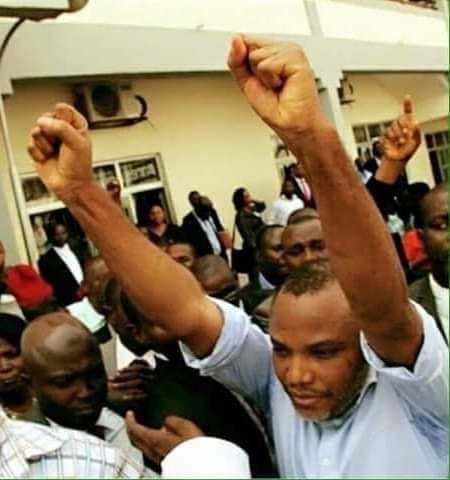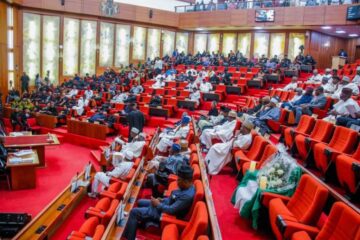A new chapter opened in the intriguing story of arrest and detention of outlawed Independent People of Biafra (IPOB) leader, Nnamdi Kanu, with a judgment by the Court of Appeal on Thursday discharging him of the case of treasonable felony and terrorism the federal government instituted against him.
The Appeal Court, in a judgment read by Justice Oludotun Adefope-Okojie, held that Nigeria’s failure to follow due process in Kanu’s extradition process was injurious to the charges. It also held that the failure of the federal government to disclose where and when the alleged offences were committed was fatal to the terrorism charges against him and made them liable to dismissal.
In a manner reminiscent of the abortive abduction of Second Republic Minister of Transport Alhaji Umaru Dikko from the United Kingdom by agents of the Gen. Muhammadu Buhari-led military administration in 1984, Kanu was abducted from Kenya on June 26 last year. But unlike Dikko, his forcible rendition was successful and he was ferried into the country to face trial.
The IPOB leader had previously been arrested in Lagos on October 14, 2015 and was detained for more than one year before he was granted bail in April 2017 by a federal high court sitting in Abuja. He however jumped bail and fled abroad, from where he continued his agitation for the independent state of Biafra.
From his outpost abroad, he issued incendiary statements to his followers at home using the instrumentality of Radio Biafra, particularly during the EndSARS riots when many of the burning and killing incidents that occurred in Lagos, Port Harcourt and other parts of the country were allegedly masterminded by his group.
The violent activities of the IPOB group in the Southeast and beyond, especially after Kanu announced the formation of an armed wing of IPOB known as the Easter Security Network (ESN) had prompted the federal government to label it a terrorist group. Although he said the mission of ESN was to defend the people of the Southeast region against bandits and killer herdsmen who he said were terrorising the region, the militant group soon turned into a behemoth that terrorised the region’s elites deemed to be opposed or even indifferent to IPOB’s agitation.
The ordinary citizens of the region were later given a dose of ESN’s bitter pill when it announced Mondays as compulsory holiday on which the enterprising population of the region must observe IPOB’s sit-at-home order. The outfit issued all the Southeast governors a 14-day ultimatum to ban open grazing in the region or they (ESN) would enforce the ban.
The foregoing became the point of confrontation between IPOB and the military with the resultant tension in the region after agents of the Nigerian Army invaded Orlu Local Government Area in a bid to crush the ESN. In the ensuing face-off, ESN militants allegedly shot four soldiers dead while six civilians also lost their lives. For many weeks afterwards, the federal government mobilised security forces to the area while the hunt for Kanu continued until he was arrested in Kenya in June 2021 with the help of the International Police (INTERPOL), which immediately handed him over to the federal government.
The move was, however, regarded by many as an abduction or forcible rendition because it failed to follow due process of extradition as contained in the Nigerian Extradition Act. The Court of Appeal sitting in Abuja appeared to align itself with this line of thought with its Thursday judgment describing the process by which Kanu was brought back into the country as illegal and also discharging him of any act of terrorism.
But while Kanu’s supporters are throwing banter over the judgment there are indications that it may not yet be uhuru for the IPOB leader who though may have scaled the hurdle in the case over the nature of his extradition would still have to cross the barrier in respect of the issues preceding his decision to jump bail.
The Attorney-General of the Federation and Minister of Justice, Abubakar Malami, hinted that much when he declared in his reaction to Thursday’s judgment that Kanu was only discharged but not acquitted because there are other issues predating the IPOB leader’s rendition, which are “valid issues for judicial determination”. Malami’s position will certainly be bad news for Kanu’s supporters and the mass of the people in the Southeast region who, contrary to their initial belief, may have had to endure more of the weekly sit-at-home order of IPOB.
Kanu’s kinsmen, obviously tired of IPOB’s sit-at-home order, have seized every available opportunity to plead with President Buhari for his release. They did so when he visited the Southeast recently. Before then, a delegation of Southeast leaders had visited him in the Aso Rock Presidential Villa to make a similar plea. In each instance, the President declared unambiguously that it is a matter for the courts. But the tone of his response on each occasion leaves no discerning mind in doubt about his administration’s determination to explore the law in the matter to the last card.
The matter, all things considered, may not have reached its final destination and it would not be a surprise if it goes all the way to the Supreme Court. Government’s determination to hold on to Kanu may be informed by its realization that the IPOB leader is only the face of the pro-Biafra agitation while the forces propelling him are operating in the background. Hence setting him free may not necessarily guarantee an end to the agitation.
Why court freed him
In ordering Nnamdi Kanu’s discharge on Thursday, the three-member panel of the Court of Appeal, Abuja hinged its decision on two key grounds. The first was on the propriety or otherwise of the manner in which the Nigerian government brought Kanu back to the country from Kenya.
The second was on whether or not the Federal Government could proceed with its trial of Kanu based on the existing terrorism charge, in respect of which Kanu was being tried before he jumped bail.
In determining both issues, the three-member panel, led by Justice Jummai Sankey, faulted the procedure adopted by the Federal Government in bringing Kanu back to Nigeria.
The panel, which also included Justices Oludotun Adefope-Okojie and Ebiewe Tobi held that the failure of the Federal Government to abide by both internal and local enactment in returning Kanu to Nigeria has robbed the Federal High Court, before which the terrorism case was pending, the jurisdiction to continue with the trial.
In faulting Kanu’s rendition from Kenya, Justice Adefope-Okojie held that the “extraordinary rendition, without adherence to due process of the law was a gross violation of all international conventions, protocols and guidelines that Nigeria is signatory to.”
The judge added that such act equally breached Kanu’s fundamental human rights.
The Appeal Court added that the respondent (FG), failed to refute the allegation that Kanu was in Kenya and that he was abducted and brought back to Nigeria without going through the prescribed extradition proceeding.
The court noted that the FG was “ominously silent” on the issue of whether or not the proper procedure for extradition was complied with.
“The forceful abduction from Kenya and rendition to Nigeria by the Federal Government is a clear violation of International Convention, Protocols and Guidelines.
“The manner in which the appellant was forcefully abducted and rendered into the country shows appalling disregard to international conventions and treaties on the part of the respondent, including its local laws – the Terrorism Prevention Act.
“Section 1(a) (2) of the Terrorism Prevention Act provides among others that the Attorney General of the Federation shall be the authority for the effective implementation of the Act to conform with International Standard, Treaties and Convention.
“The respondent (FG) was mandated by law to establish that it abides by the law in the extradition of the appellant, yet, the respondent has no answer, rather sought refuge to the provisions of the Administrative of Criminal Justice Act, 2015.
“In law, that is a costly failure and such failure is an admittance by the respondent.
“Where a party fails to controvert a deposition by an opponent, the issue not contested is deemed conceded,” the court said.
It added that it was the responsibility of the FG to prove the legality of the appellant’s (Kanu’s) arrest and return from Kenya.
The appellate court noted that Nigeria is a signatory to the OAU Convention, which it ratified on April 28, 2022, and the African Charter on Human and Peoples Rights, which stipulates how a wanted person could be transferred from one country to another.
The court was of the view that any extradition request must be in writing, and accompanied with a statement, indicating the offences for which the affected person is wanted.
On the implementation of the wrongful rendition on the capacity of the Federal High Court (per Justice Binta Nyako) to proceed with the pending terrorism charge.
The court held that Kanu’s arrest, abduction and subsequent arraignment before a Federal High Court violated international convention on terrorism and thus robbed any court of law in Nigeria the necessary jurisdiction to entertain the suit.
“The warrant of arrest issued against Kanu by the Federal High Court can only be executed in any part of Nigeria and not outside the shores of the country,” and therefore, the Nigerian government could not rely on it to breach the established procedure for extradition.
The appellate court proceeded to hold that the unlawful act of the FG tainted the entire proceeding it initiated against Kanu before the Federal High court, which amounted to “an abuse of criminal prosecution in general.”
It added: “By engaging in utter unlawful and illegal acts and in breach of its own laws in the instant matter, the Federal Government did not come to equity in clean hands and must be called to order.
“With appalling disregard to local and international laws, the Federal Government has lost the right to put the appellant trial for any offence.
“Treaties and Protocols are meant to be obeyed. No government in the world is permitted to abduct anybody without following due process of extradition.
“Nigeria is not an exception or excused. Nigeria must obey her own law and that of international, so as to avoid anarchy,” the court said.
It then proceeded to hold that the trial court lacked the requisite jurisdiction to handle the charge against Kanu, as he was not properly arraigned before the court.
The appellate court noted that the offences with which Kanu was charged were said to have been committed in Kenya and not in Nigeria.
[The Nation]




